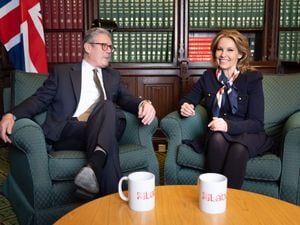Huge salaries for academy bosses ‘verging on criminality’ – union chief
An NASUWT report warns that a lack of ‘adequate’ funding for schools during the pandemic is placing staff and pupils at risk.

The salaries being paid to some academy chain leaders is “verging on criminality”, a union chief has said.
Phil Kemp, the new president of the NASUWT teaching union, warned of a “Wild West” school system in England where education is “too often” in the hands of a small group of academy chain chief executives.
In a speech to the NASUWT’s virtual annual conference, Mr Kemp hit out at the “huge salaries” of academy chain leaders, which he said have “very little if no impact on student progress or teaching and learning”.
Mr Kemp, a North Tyneside teacher who works with pupils who have been, or are in danger of being, excluded from mainstream schools, called for “significant and targeted funding” for schools.
He said: “The salaries being paid to individuals in some of these academy trusts is not just eye-watering, it’s verging on criminality in my view.
“So many salaries, paid for from the public purse, rising well over the £200,000 mark, and some well-publicised, almost reaching half a million pounds.”
Addressing the conference on Friday, Mr Kemp called for the national pay scale for all teachers and heads to be reintroduced “as soon as possible”.
Academies, which are state schools that sit outside local authority control, have more freedom over areas such as the curriculum and staff pay.
“The snouts have to come out of the trough and the public purse protected from those who will take advantage of the increasing deregulation of our education system. Those taking these huge salaries should hang their heads in shame,” he said.
An analysis by the NASUWT union suggests that the combined remuneration of chief executives in the 20 largest academy trusts in 2018-19 was £4.72 million, or an average of £23,000 per chief executive.
The 57-year-old told delegates at the conference: “Adequate funding for education is so essential – actually, no, not adequate, generous funding, the funding where it’s not paper or glue-sticks, it’s both.
“Value for money is, of course, vital. But education seems to have become yet another way private companies and individuals can line their pockets whilst headteachers have to penny-pinch and teachers feel compelled to put their hands in their own pockets.
“The latest example of this incredible waste of much-needed funding in education is the Government’s roll out of post-Covid education recovery, lining the pockets of private companies.”
The union’s president accused the Government of taking a “piecemeal attitude” on educational recovery, adding that the catch-up funding announced “is not good enough” for pupils.
In a report, which has been published as the NASUWT conference gets under way, the union warns that a lack of “adequate” funding for schools in England during the pandemic is placing staff and pupils at risk.
They say they are now beginning to receive reports of planned redundancies, particularly among school support staff who often help with Covid control measures in schools outside lesson times.
Mr Kemp added that statutory provision of schools-based counselling in every primary and secondary school in England is “more than needed in a post-Covid world”.
He said: “Mental Health Awareness Week falls in May this year. But for those living with anxiety or depression, phobias or eating disorders, to complex personality disorders, every day is a mental health day.
“Teachers see these struggles in their pupils day in, day out. They may themselves be struggling. Knuckling down and just getting on with it. It is not a good enough strategy.”
A Department for Education spokesman said: “The overwhelming majority of academy trusts set reasonable, justifiable levels of pay for their leaders, recognising that many will be responsible for several schools within a trust and that we must attract the best leaders to continue raising standards.
“We consistently challenge trusts where we deem executive pay to be too high, and will continue to do so when it is neither proportionate nor directly linked to improving pupil outcomes.”





